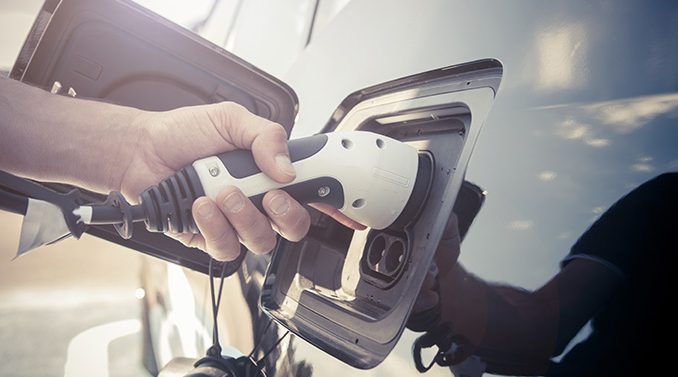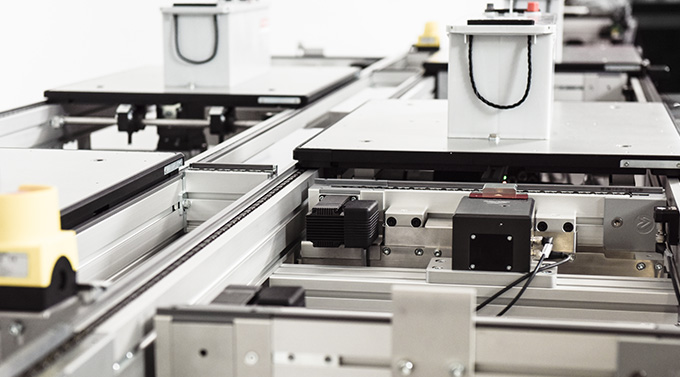
There are a lot of changes going on in the automotive industry. Electric cars are taking an increasingly larger role in reducing CO2 emissions and, in turn, help reduce climate change. Thus, there is a large need on the market for batteries for electric cars, and the need will most likely increase even more in the years to come. In this blog article, I will describe what the battery production for electric cars looks like today and how the production can be improved in the future.
The automotive industry switches focus to electricity and mechatronics
 It is said that by the year 2020, probably half of all the produced cars in the world will be electric cars, which will highly affect the automotive industry. The traditional car manufacturers that have offered mechanical solutions are forced to switch focus and are now looking for new ways to stay competitive on the market. It is not only the production that will change but also the competence of the company and the employees. The mechanical knowledge that once was so sought after is now being replaced by knowledge of electrical components and mechatronics.
It is said that by the year 2020, probably half of all the produced cars in the world will be electric cars, which will highly affect the automotive industry. The traditional car manufacturers that have offered mechanical solutions are forced to switch focus and are now looking for new ways to stay competitive on the market. It is not only the production that will change but also the competence of the company and the employees. The mechanical knowledge that once was so sought after is now being replaced by knowledge of electrical components and mechatronics.
The large disadvantage with electric cars is that there are limitations on how far you can drive without having to charge the car. Also, there are several weaknesses related to the charging station network. Many manufacturers have their own charging stations, which allows you to only charge your car at specific stations. The number of stations is also quite limited. However, there are also many advantages. Driving an electric car is a clean process that minimizes exhaust gases and also contributes to a quiet and comfortable ride.
Different concepts of how to produce batteries for electric cars
Common for all electric cars is that they are driven by batteries. However, all electric car manufacturers have their own concepts of what batteries to use, how to produce them and where the batteries should be placed in the car. Having all electric car manufacturers produce the batteries on their own is a costly process that does not favor the customers nor the car manufacturers. Therefore, there is a big need in the electric car industry to standardize both the process of manufacturing the batteries as well as how to handle, for example, the charging station network.
Security and traceability in the battery production
 Since the electric car industry is relatively new, the battery development has not had time to evolve yet. Today, there are different types of batteries that can be used for electric cars and they all have different sizes and shapes. Some are produced by the car manufacturers themselves, and some are produced by battery suppliers that manufacture and install the batteries directly in the factories. Since the batteries differ, so does the production. However, all battery production must have a high level of security in order to, for example, avoid short circuits and protect both production equipment and staff from the material inside the batteries. The production must also have a high level of traceability to be able to maintain a high quality of the batteries. In general, having the correct production equipment is very important to achieve a successful production. If the batteries are not manufactured in time it could lead to devastating consequences for the car manufacturer.
Since the electric car industry is relatively new, the battery development has not had time to evolve yet. Today, there are different types of batteries that can be used for electric cars and they all have different sizes and shapes. Some are produced by the car manufacturers themselves, and some are produced by battery suppliers that manufacture and install the batteries directly in the factories. Since the batteries differ, so does the production. However, all battery production must have a high level of security in order to, for example, avoid short circuits and protect both production equipment and staff from the material inside the batteries. The production must also have a high level of traceability to be able to maintain a high quality of the batteries. In general, having the correct production equipment is very important to achieve a successful production. If the batteries are not manufactured in time it could lead to devastating consequences for the car manufacturer.
A more cost-efficient solution for producing environmental-friendly vehicles
The future of the battery production for electric cars is, to some extent, uncertain. Hopefully, the industry becomes more standardized, which would benefit both the customers, the car manufacturers as well as the suppliers of production equipment. That would lead to a more cost-efficient solution for all parties involved, especially as the industry of electric cars is expected to grow considerably within the coming years.
There are also many questions that still remain to be answered. Will car manufacturers produce their own batteries in the future, or will they order batteries from a supplier that is specialized in producing batteries for the automotive industry? What will the durability of the batteries be after a few years and what process will be used when recycling the batteries? In many cases, the batteries increase the weight of the car which, in turn, can lead to increased costs for the customer. Also, longer range is requested to increase the usability of the cars even more and to avoid the range anxiety that is often associated with electric cars. Due to all these questions, it is not yet clear if fully electric cars is only a temporary solution that might get replaced by an, even more, environmental-friendly solution in the future. For example, fuel cells are developed further and could be the next step after, or together with, batteries. However, which method that will develop first still remains to be seen.
FlexLink creates optimized solutions for the production of car batteries
 It is a challenge to produce equipment for the car battery production since all battery productions look different. Therefore, it is important to customize each production solution so it fits the customer’s specific needs. FlexLink puts a lot of effort into creating flexible solutions so they can fit as manufacturers as possible. As a supplier of smart and automated production equipment, it is our responsibility to contribute to the manufacturing of vehicles that reduce the environmental footprint. Decreasing CO2 emissions is one of the major factors to reduce climate change, which also makes the reduction of CO2 emissions one of the main concerns for FlexLink. Therefore, we want to be a part of the future development of more environmental-friendly vehicles.
It is a challenge to produce equipment for the car battery production since all battery productions look different. Therefore, it is important to customize each production solution so it fits the customer’s specific needs. FlexLink puts a lot of effort into creating flexible solutions so they can fit as manufacturers as possible. As a supplier of smart and automated production equipment, it is our responsibility to contribute to the manufacturing of vehicles that reduce the environmental footprint. Decreasing CO2 emissions is one of the major factors to reduce climate change, which also makes the reduction of CO2 emissions one of the main concerns for FlexLink. Therefore, we want to be a part of the future development of more environmental-friendly vehicles.
I hope you enjoyed reading my blog article about battery production in the automotive industry. Feel free to contact me with any questions or visit our website, smart factory blog or social media channels to get more information about FlexLink and our offer.




Manufacturing of traction HV batteries is a two step process: [1] lithium cell production, and [2] battery pack assembly.
The production of lithium cells will remain a domain of key market players, like LG Chem, Samsung, Panasonic, Tesla or specialized companies, like A123, Valance, SAFT, etc.
The battery pack assembly, that had been a domain of battery producers, is transitioning to vehicle OEMs. As it has been mentioned in the article, the market is growing, and OEMs want to add this to their in-house capabilities.
Is Flexlink focusing on cell production or pack assembly, or both?
Thanks for your interest in our article. FlexLink’s main objective is to enable an efficient production flow also for battery production. We are familiar with the industry and how different processes work as well as what type of machines are used in the production line. Our focus is to optimize the different processes when moving the batteries between different machines. It’s always important for us to find the most suitable solution for our customers.
Very nice and interesting.
Thanks Tomas, we appreciate your feedback! Hope you will enjoy following the blog further on.